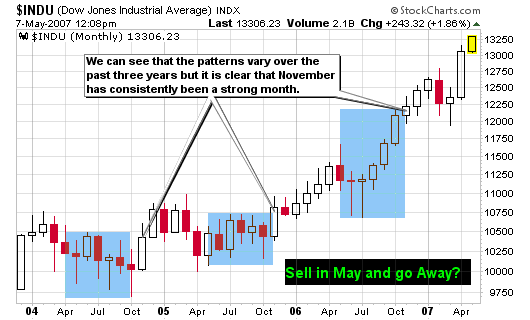It seems that everyone is writing about this market phenomenon over the past week so I figure I will join the party but structure my article with statistics using the help of the Stock Trader’s Almanac written by Jeffery A. Hirsch and Yale Hirsch.

For the record, I am not selling just because the calendar says May. I just wanted to shed some light on the statistical data as it interests me
Worst six months of the year begin in May:
* All data is from the DJIA from 1950 to 2005
- A $10,000 investment in the DJIA compounded to $544,323 for the period beginning in November through April over the past 56 years (termed the best six months)
- Compare this to a $272 loss; yes I said loss for the same investment in May through October (termed the worst six months)
- 44 of the 56 periods ended with a gain in the November through April period
- Only 33 periods ended with a gain versus 23 losing periods in May through October
- The average gain for the November through April period is 7.9% (56 yrs)
- The average gain for May through October is 0.3% but the period did have an overall loss of $272 as mentioned above
- The best six months gained 11,691.79 Dow points over the 56 yrs (data ends in 2005)
- The worst six months actually lost 538.98 Dow points
- Top performing period for best six months was a gain of 29.8% in 1985 and then 25.6% in 1998
- Top performing period for worst six months was a gain of 19.2% in 1958 and then 16.9% in 1982
- The poorest performing period for the best six months was a loss of 14.0% in 1969 and then 12.5% in 1973
- The poorest performing period for the worst six months was a loss of 25.2% in 2002 and then 22.4% in 1974
- The best six months has only had one losing period in the past 22 years and that was only 2.2%
- The worst six months has had eight losing periods over the past 22 years with several in double digits
- Seven of the past eight years have been losers for the worst six months
- All of these results are based without timing the market using technical analysis
- Using a simple MACD indicator to time the entries and exits, the gain during the best six months rises up to $1,548,121 while the loss during the worst six months increases to $6,646.
- Finally, five of the last nine May months have been down for the markets; starting the period of the “worst six months”
One side note: the Stock Trader’s Almanac notes that the Nasdaq actually has a best eight month period from November to June.
For further detail, grab a copy of the Almanac as I buy one every year for the excellent statitical information and the great quotes.





Don’t sell in may for the sake of selling. If everything looks good, why sell, stick with it. Always stay with your system.
John,
Of course not! The data interests me and so many blogs and market outlets have mentioned the statement, I felt it was an appropriate entry to write.
I agree, never sell for the sake of selling.
Chris,
Is your MSW still active?
Mark,
MSW is currently under a re-design and will be back up by the end of the month (no more subscriptions).
Will your new MSW have the same content as before although it becomes free for all?
Thanks
Mark,
It will be very similar as I will focus on daily screens, monthly recaps, MSW portfolio, MSW Index and sector and industry analysis. All general market analysis, case studies and special stock analysis will be done at this blog. The new site will be run using a blog platform so users can comment and I am converse back. It should be fun and I am looking forward to getting it up and running.
Thanks for your generousity. i am looking forward to learn from your method so that i can be a better investor.
a newbie
I only started in the stock market last summer, July 17 to be exact. I managed to increase 38% by the end of October.
I want to make this clear: it is fine to invest in May thru October as I do it myself but the study was interesting. I mean, who sits here and only invests in the DJIA?